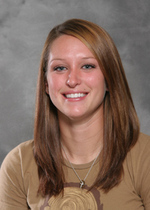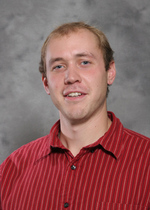The University of Minnesota, Crookston continues to move forward in pursuing energy conservation and sustainability goals with the recent awarding of a Clean Energy Resource Teams (CERTS) grant of $11,000 according to Dan Svedarsky, Ph.D., director of the U of M, Crookston Center for Sustainability. The grant will support students being paired with a faculty or staff member to address two projects: conduct a feasibility study for a methane digester and measure building-to-building energy use.
"The grant application was primarily developed by Center staff, Chris Waltz (pictured below on left) and Lisa Gentele (pictured on right), in conjunction with U of M, Crookston faculty and staff," according to Svedarsky. Waltz is an energy conservation specialist supported by the Minnesota GreenCorps and Gentele is a student sustainability assistant working with the Center, the Otter Tail Energy Challenge program, and chair of the Crookston Students for Sustainable Development (CSSD).
in conjunction with U of M, Crookston faculty and staff," according to Svedarsky. Waltz is an energy conservation specialist supported by the Minnesota GreenCorps and Gentele is a student sustainability assistant working with the Center, the Otter Tail Energy Challenge program, and chair of the Crookston Students for Sustainable Development (CSSD).
Key personnel involved in collaborating with students will be U of M, Crookston faculty members: Christo Robberts, Paul Aakre, and Kent Freberg with the methane generator study. Staff members: Tim Norton, director of Facility Management and Operations; Rusty Remick, electrician; and Ken Johnson, Otter Tail Power Company, will advise the building-to-building energy use study.
"This grant will nicely support the implementation of the Otter Tail Energy Challenge awarded to the Crookston campus earlier in the fall," according to Waltz. The energy use study will evaluate the installation of better monitoring systems so that students in residence halls can engage in competitions to strive to reduce energy consumption and lessen the impact on global carbon emissions. Students will come from a variety of majors on campus and will begin working on the project early in spring semester 2010.
"Grant funds will support U of M, Crookston students to gain research experience in sustainability and energy as well as develop leadership skills using the campus as a real-world living laboratory," notes Waltz. "The program will bring together clubs and organizations, classes, and individuals across campus disciplines to work on applied sustainable research projects which is necessary for the training and development of new environmental professionals."
 Waltz, a spring 2009 U of M, Crookston graduate, co-authored the 2008 CERTS grant, "LEEDing Crookston to a Sustainable Future," which allowed Crookston campus students and the campus community to achieve a new level of sustainability awareness and engagement. The grant also facilitated construction of Evergreen Hall according to Leadership in Energy and Environmental Design (LEED) standards making it the first LEED-certified dormitory within the University of Minnesota system. Students hosted open forums and guest speakers to educate the campus community on the topic of sustainability and its broad applications to energy efficiency and conservation, economic development, local foods, recycling, and atmospheric carbon balance. In addition, the grant supported the Crookston Students for Sustainable Development to host an educational retreat to the ultimate energy efficient, Biohaus (Bio-House), at the Concordia Language Camp near Bemidji, Minn. This retreat was designed to share ideas between students, not only at the Crookston campus but also students from other campuses such as Bemidji State University.
Waltz, a spring 2009 U of M, Crookston graduate, co-authored the 2008 CERTS grant, "LEEDing Crookston to a Sustainable Future," which allowed Crookston campus students and the campus community to achieve a new level of sustainability awareness and engagement. The grant also facilitated construction of Evergreen Hall according to Leadership in Energy and Environmental Design (LEED) standards making it the first LEED-certified dormitory within the University of Minnesota system. Students hosted open forums and guest speakers to educate the campus community on the topic of sustainability and its broad applications to energy efficiency and conservation, economic development, local foods, recycling, and atmospheric carbon balance. In addition, the grant supported the Crookston Students for Sustainable Development to host an educational retreat to the ultimate energy efficient, Biohaus (Bio-House), at the Concordia Language Camp near Bemidji, Minn. This retreat was designed to share ideas between students, not only at the Crookston campus but also students from other campuses such as Bemidji State University.
"It has been an absolute delight working with these UMC students the past couple of years as they have engaged in sustainability initiatives," according to Svedarsky. "And this student sustainability action is spreading nationally and globally as well. I just returned from the U.N. Conference on Climate Change in Copenhagen and the commitment of young people to planetary stewardship is nothing short of remarkable. I would also be remiss in not recognizing the key supporting role of Linda Kingery, executive director of the Northwest Regional Sustainable Development Partnership, and U of M, Crookston professor David DeMuth. These two individuals are tireless strategists in facilitating many campus and regional initiatives related to sustainability and the environment."
For more information contact: Waltz at 218-281-8128 or waltz020@umn.edu and Svedarsky at 218-281-8129 or dsvedars@umn.edu at the Center for Sustainability, U of M, Crookston.
Today the University of Minnesota, Crookston delivers more than 25 applied-science undergraduate degree programs and 50 concentrations, including several online degrees, in agriculture; arts, humanities and social sciences; business; math, science and technology; and natural resources. To learn more, visit www.UMCrookston.edu.
"The grant application was primarily developed by Center staff, Chris Waltz (pictured below on left) and Lisa Gentele (pictured on right),
 in conjunction with U of M, Crookston faculty and staff," according to Svedarsky. Waltz is an energy conservation specialist supported by the Minnesota GreenCorps and Gentele is a student sustainability assistant working with the Center, the Otter Tail Energy Challenge program, and chair of the Crookston Students for Sustainable Development (CSSD).
in conjunction with U of M, Crookston faculty and staff," according to Svedarsky. Waltz is an energy conservation specialist supported by the Minnesota GreenCorps and Gentele is a student sustainability assistant working with the Center, the Otter Tail Energy Challenge program, and chair of the Crookston Students for Sustainable Development (CSSD). Key personnel involved in collaborating with students will be U of M, Crookston faculty members: Christo Robberts, Paul Aakre, and Kent Freberg with the methane generator study. Staff members: Tim Norton, director of Facility Management and Operations; Rusty Remick, electrician; and Ken Johnson, Otter Tail Power Company, will advise the building-to-building energy use study.
"This grant will nicely support the implementation of the Otter Tail Energy Challenge awarded to the Crookston campus earlier in the fall," according to Waltz. The energy use study will evaluate the installation of better monitoring systems so that students in residence halls can engage in competitions to strive to reduce energy consumption and lessen the impact on global carbon emissions. Students will come from a variety of majors on campus and will begin working on the project early in spring semester 2010.
"Grant funds will support U of M, Crookston students to gain research experience in sustainability and energy as well as develop leadership skills using the campus as a real-world living laboratory," notes Waltz. "The program will bring together clubs and organizations, classes, and individuals across campus disciplines to work on applied sustainable research projects which is necessary for the training and development of new environmental professionals."
 Waltz, a spring 2009 U of M, Crookston graduate, co-authored the 2008 CERTS grant, "LEEDing Crookston to a Sustainable Future," which allowed Crookston campus students and the campus community to achieve a new level of sustainability awareness and engagement. The grant also facilitated construction of Evergreen Hall according to Leadership in Energy and Environmental Design (LEED) standards making it the first LEED-certified dormitory within the University of Minnesota system. Students hosted open forums and guest speakers to educate the campus community on the topic of sustainability and its broad applications to energy efficiency and conservation, economic development, local foods, recycling, and atmospheric carbon balance. In addition, the grant supported the Crookston Students for Sustainable Development to host an educational retreat to the ultimate energy efficient, Biohaus (Bio-House), at the Concordia Language Camp near Bemidji, Minn. This retreat was designed to share ideas between students, not only at the Crookston campus but also students from other campuses such as Bemidji State University.
Waltz, a spring 2009 U of M, Crookston graduate, co-authored the 2008 CERTS grant, "LEEDing Crookston to a Sustainable Future," which allowed Crookston campus students and the campus community to achieve a new level of sustainability awareness and engagement. The grant also facilitated construction of Evergreen Hall according to Leadership in Energy and Environmental Design (LEED) standards making it the first LEED-certified dormitory within the University of Minnesota system. Students hosted open forums and guest speakers to educate the campus community on the topic of sustainability and its broad applications to energy efficiency and conservation, economic development, local foods, recycling, and atmospheric carbon balance. In addition, the grant supported the Crookston Students for Sustainable Development to host an educational retreat to the ultimate energy efficient, Biohaus (Bio-House), at the Concordia Language Camp near Bemidji, Minn. This retreat was designed to share ideas between students, not only at the Crookston campus but also students from other campuses such as Bemidji State University. "It has been an absolute delight working with these UMC students the past couple of years as they have engaged in sustainability initiatives," according to Svedarsky. "And this student sustainability action is spreading nationally and globally as well. I just returned from the U.N. Conference on Climate Change in Copenhagen and the commitment of young people to planetary stewardship is nothing short of remarkable. I would also be remiss in not recognizing the key supporting role of Linda Kingery, executive director of the Northwest Regional Sustainable Development Partnership, and U of M, Crookston professor David DeMuth. These two individuals are tireless strategists in facilitating many campus and regional initiatives related to sustainability and the environment."
For more information contact: Waltz at 218-281-8128 or waltz020@umn.edu and Svedarsky at 218-281-8129 or dsvedars@umn.edu at the Center for Sustainability, U of M, Crookston.
Today the University of Minnesota, Crookston delivers more than 25 applied-science undergraduate degree programs and 50 concentrations, including several online degrees, in agriculture; arts, humanities and social sciences; business; math, science and technology; and natural resources. To learn more, visit www.UMCrookston.edu.
Contact: Dan Svedarsky, director, Center for Sustainability, 218-281-8129 (dsvedars@umn.edu); Elizabeth Tollefson, assistant director, communications, 218-281-8432 (ltollefs@umn.edu)

